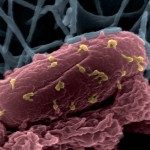Lien vers Pubmed [PMID] – 23063405
Virology 2012 Dec;434(2):151-61
Viruses are ubiquitous and can infect any of the three existing cellular lineages (Archaea, Bacteria and Eukarya). Despite the persisting negative public perception of these entities, scientists learnt how to domesticate some of them. The study of molecular mechanisms essential to the completion of viral cycles has greatly contributed to deciphering fundamental processes in biology. Nowadays, viruses have entered the biotechnological era and numerous applications have already been developed. Viral-derived tools are used to manipulate genetic information, detect, diagnose, control and cure infectious diseases, or even design new structural assemblies. With the recent advances in the field of metagenomics, an overwhelming amount of information on novel viruses has become available. As current tools have been historically developed from a limited number of viruses, the potential of discoveries from new archaeal, bacterial and eukaryotic viruses may be limited only by our understanding of the multiple facets of viral cycles.

